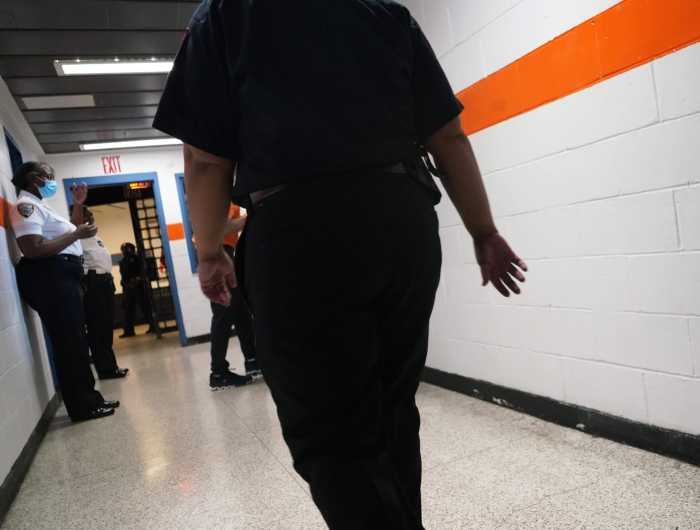Peter K. Harris sold crystal, but credited for 10 months served after identifying other sellers
A methamphetamine dealer-turned-confidential informant whose work with the federal Drug Enforcement Administration (DEA) netted one crystal meth dealer a five-year prison term and a second dealer a ten-year sentence, walked out of court a free man on July 11 having served just ten months in jail.
“As I explained earlier I will depart downward from the statutory guidelines,” said Judge Laura Taylor Swain at the sentencing hearing for Peter K. Harris. “It is the judgment of this court that your sentence will be equal to time served.”
Harris, 43, was arrested in February 2003 after he sold meth to a civilian confidential informant, identified only as John in court records, on three occasions in 2002 and 2003. The transactions were recorded using a “kel transmitter”—in common parlance, a wire—that John wore, according to court records.
Harris cooperated with the government to reduce his sentence and arranged crystal purchases from James Urinyi, 34, and Gary Kiss, 43. Those transactions took place in Harris’ apartment and were videotaped.
The arrests of Urinyi and Kiss were part of a crackdown that law enforcement officials first launched in 2003 aiming to curb the distribution of crystal in New York’s gay community.
Kiss, who didn’t cooperate with the feds, was sentenced to five years in federal prison, five years of supervised release when he completes his prison sentence and a $70,000 fine on June 2. Kiss’ sentence also represented a downward departure or reduction from statutory guidelines, though considerably less dramatic, based on evidence introduced in court about his successful recovery from crystal addiction.
Urinyi, like Harris, had agreed to become a confidential informant, but had a history of crystal use and began using meth again after becoming an informant, which violated his deal with authorities. Defendants who enter into arrangements to cooperate in return for a reduced sentence must plead guilty to the most serious charge against them. If they violate the deal, they are sentenced under that top count. Urinyi was sentenced to 121 months, or just over ten years, in November of 2004.
Cooperating is often the only way to avoid the harsh federal mandatory minimum sentences, attorneys familiar with such cases say.
“Cooperation is the cornerstone of the federal system,” said Isabelle A. Kirshner, a criminal defense attorney who has represented gay men charged with meth dealing, at a 2004 panel discussion on crystal meth and the law. “It’s the only way to get around mandatory sentences.”
Under his sentence, Harris must forfeit $167,000 he made from selling meth plus another $13,000 in cash that was found in a safe in his home and inside a bank safety deposit box. He will be on probation for four years.
Gay City News could not learn if Harris had helped on other cases, but Swain, during the sentencing proceedings, said he had provided “substantial assistance in the investigation and prosecution of other individuals” and had “worked extensively with law enforcement” on cases involving “several individuals.”
Matthew Coleman, a DEA special agent who testified at the hearing told Swain that Harris’ cooperation “was significant and he did put himself in harm’s way.”
Three friends and a family member attended the sentencing and Harris, dressed in prison garb despite his attorney’s request that he be allowed to appear in a suit, spoke briefly at his hearing.
“I’d like to apologize to the court for my actions,” he said. “I am a better person now for what I have been through.”
Reflecting the jeopardy that Harris avoided by his cooperation, two of his co-conspirators received harsh sentences.
In February 2004, Ronald “Sammy” Watkins, 36, was sentenced to 87 months in prison, or just over seven years, and five years probation after he sold meth on three occasions in early 2003 to the same law enforcement informant Harris sold to.
Watkins’ attorney, Nicole Auerbach, had argued that her client should receive a reduced sentence because he had been diagnosed with both bipolar disorder and AIDS. Watkins was diagnosed with bipolar disorder, or manic depression, in 1992 and had received care from both a psychiatrist and a therapist, though he often did not take his prescribed medications, according to court records. Court records also indicated that he used meth, cocaine and Special K, smoked crack, and drank alcohol for years, but had tried, with only periodic success, to stop his drug use.
Watkins was diagnosed as HIV-positive in 1994 and by the time of his sentencing in 2004 he had progressed to an AIDS diagnosis.
Judge Jed S. Rakoff, who presided over Watkins’ sentencing, rejected Auerbach’s argument.
Harris’ other co-conspirator, Kurt Douglas Guiterrez, 35, was sentenced to 121 months, or just over ten years, and five years of supervised release though, as a native of Belize, he will likely be deported when his prison time is up. He brokered meth sales, though he did not directly handle the drug.
“I was the contact person involved in the sale of methamphetamines between the buyer, John, and the seller, Watkins and Harris,” he said at a June 2003 hearing.
Guiterrez was also a meth user.
“In the mid-1990s, he entered into drug use that ultimately turned into drug addiction,” Rakoff said of Guiterrez at his September 2003 sentencing hearing.
Hans Reynoso, 29, was identified as one of Watkins’ drug suppliers. He was arrested in February of 2003 in possession of 800 Ecstasy pills. In March 2004, he was sentenced to time served and three years of supervised probation after he entered into a cooperation agreement with the government similar to the one Harris has.
gaycitynews.com
































